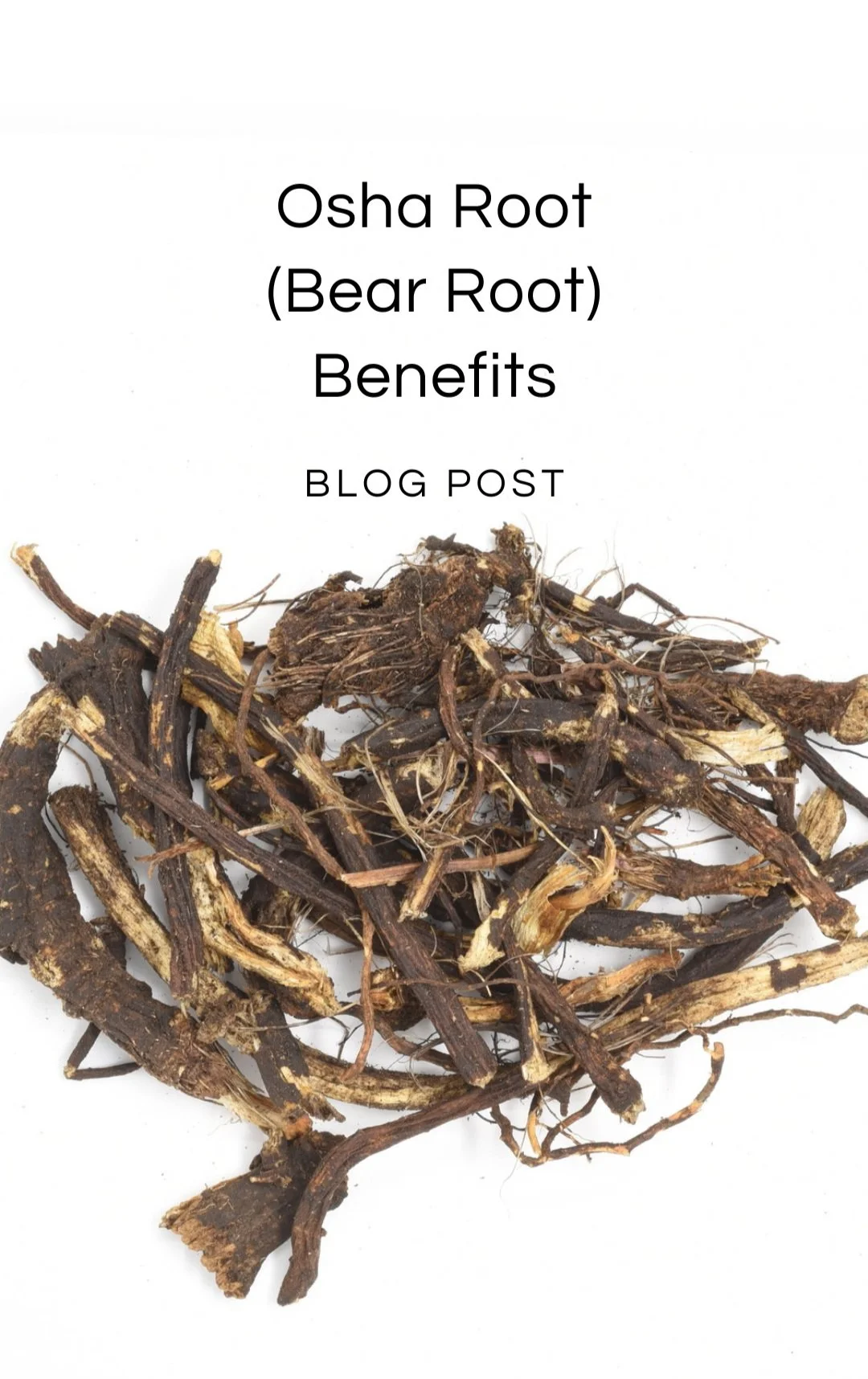Osha Root (Bear Root) Benefits
What Is Osha Root?
Osha root, otherwise known as bear root or Ligusticum porteri, is native to Mexico, America’s Southwest, and the Rocky Mountains. Much like carrots and parsley, osha root is in the Apiaceae family, which is why the flowers of each plant look similar. There are 12 different Ligusticum species, however, the osha root that we prize for its medicinal benefits is only one of these 12 varieties.
So, why are we so excited about osha root?
History of Osha Root
Osha root has been a well-loved remedy by Indigenous Peoples for over 2,000 years. Its dark brown, wrinkled roots have been used for colds, coughs, sore throats, the flu, bronchitis, and even pneumonia. Osha root has been given traditionally to boost immunity and improve digestion and lung health, including in cases of asthma. As for spiritual uses, osha root may help to clear negative energies and for dream divination.
Unfortunately, osha root’s popularity has led to over-harvesting, putting the species in danger. At Zhi Herbals, we are proud to only sell osha root from sustainably harvested sources, which helps to ensure its long-term future. You can read more here about our sustainability practices. Regardless of what herbal medicines you use, or where you buy them from, we ask you to only purchase sustainably harvested remedies to prevent their extinction.
A Warning About Wildcrafting
We do not advise wildcrafting your own osha root unless you’re highly skilled in plant identification. Osha root has several plant lookalikes, one of which is the poisonous hemlock. Osha root and poisonous hemlock grow wild in the same habitat and conditions, making accurate plant identification especially important.
The Evidence for Osha Root/Bear Root
Laboratory research shows us how osha root may relieve pain, be an effective immune tonic, and help to fight infections.
Pain Relief
Lab studies show that a strong tea or decoction of osha root may have strong analgesic effects, meaning pain relief without sedation. This makes it a wonderful alternative to conventional over-the-counter medicines for sore throats or coughs that often have sedative effects. Osha root may also be useful for pain caused by cramping or muscle spasms.
Stomach Ulcers
Not only could osha root relieve the pain caused by stomach ulcers, it may also protect the stomach lining and help prevent ulcer development. Traditional use of osha root in Mexico has offered the root as a solution for gastrointestinal complaints for years, and a recent lab study has found that osha root extracts can prevent stomach ulcers from forming after damage caused by large amounts of alcohol. While we do not recommend consuming large amounts of alcohol, the gastro-protective benefits of osha root are incredibly promising.
Immunity
When our immune cells fight off an infection, they are exposed to large amounts of oxidative stress. Oxidative stress can cause long-term damage if it’s allowed to continue long term without the opportunity for repair.
Osha root can protect our immune cells from oxidation, preserving them for the next battle against infection. A lab study on osha root extract at varied doses found that the highest dosage prevented 94% of damage to human immune cells in comparison to cells experiencing oxidative stress without osha root. Even better, osha root can increase levels of our bodies’ own natural antioxidants and help your body’s immune cells survive for longer.
Anti-Bacterial Benefits
Another way that osha root could support our immune and respiratory systems is through an antibacterial effect. Petri dish studies have found that extracts of osha root may be effective against E. coli, golden staph, shigella, and more. While these species of bacteria can cause stomach problems and skin infections, this research also points to the possibility that osha root could be effective for fighting other types of bacteria as well.
Using Osha/Bear Root
The most popular ways to use osha root are by making decoctions or tinctures. Decoctions are boiled and slowly simmered preparations that are ideal for roots, as they can pull out medicinal phytochemicals from deep within the tough plant material. Don’t worry if you’re new to making herbal decoctions, we wrote an article all about how to do it. We also have articles on how to make tinctures, and how to choose the best alcohol for tincture making. If you aren’t a fan of decoctions or tinctures but still want to experience the benefits of osha root, you can also try out our recipe for homemade osha root and honey lozenges.
Osha/Bear Root FAQ
Here we'll address some of your common questions about osha/bear root and its uses.
Q: What is bear root tea?
A: Bear root tea, also known as Osha root tea, is an herbal tea made from the roots of the Ligusticum porteri plant. This plant has been traditionally used by Indigenous Peoples for its medicinal properties.
Q: What are the primary benefits of drinking osha/bear root tea?
A: Osha/bear root tea can help boost the immune system, alleviate respiratory issues, reduce inflammation, soothe digestive problems, and provide antimicrobial properties to help fight infections.
Q: How does osha/bear root tea help with respiratory health?
A: The compounds in osha/bear root tea can help to open up the sinuses and bronchial tubes, which makes it useful for treating colds, coughs, and other respiratory conditions. It also helps expel phlegm and reduce inflammation of the mucous membranes.
Q: Can osha/bear root tea support the immune system?
A: Yes, osha/bear root tea contains natural immune-boosting compounds, which help strengthen the body's defenses against common pathogens.
Q: What are the anti-inflammatory effects of osha/bear root tea?
A: Osha/bear root tea contains compounds that exhibit anti-inflammatory properties, and could help to reduce pain and swelling associated with conditions like arthritis and muscle aches.
Q: Is osha/bear root tea helpful for digestive issues?
A: Yes, osha/bear root tea can aid in digestion by reducing gas, preventing bloating, and calming upset stomachs. It's also used to help stimulate appetite.
Q: Are there any side effects of drinking osha/bear root tea?
A: Osha/bear root tea is considered safe for most people, but it's always best to consult with a healthcare provider before adding new herbal remedies to your routine. Pregnant and breastfeeding women, as well as those on medication, should especially exercise caution.
Q: How often can I drink osha/bear root tea?
A: Osha/bear root tea is potent, so it is recommended to drink it in moderation. Starting with one cup per day and observing your body's reaction is a good approach. If you experience any adverse effects, discontinue use and consult a healthcare professional. Osha/bear root is most often used as a short term herbal remedy.
Q: Can anyone drink osha/bear root tea?
A: While many people can enjoy the benefits of osha/bear root tea, individuals with existing health conditions, those on medications, and pregnant or breastfeeding women should consult with a healthcare provider before consuming it to avoid potential contraindications or side effects.
Q: Does bear root help sore throats?
A: Yes. Osha root/bear root has been traditionally used in herbal medicine help soothe sore throats. The root produces a numbing sensation in the mouth, especially when the dried root is chewed. Osha contains compounds with anti-inflammatory benefits which can alleviate the pain and irritation of sore throats.
Q: How to make osha/bear root tea?
A: We suggest preparing osha/bear root tea as a decoction.
1. Use 1 to 2 teaspoons of crushed bear root per cup of water.
2. Add the bear root to cold water in a saucepan.
3. Slowly heat the water and gently simmer for approximately 20 to 40 minutes with the lid on.
4. Strain the root pieces from the liquid and it is ready to consume.
Note: Osha/bear root is an excellent addition to our Lung Revitalizing Tea, and we encourage you to try combining them at home.
Q: What are osha/bear root tea benefits?
A: Osha/bear root tea offers several benefits:
Relief from sore throat and cough
Clearing mucus from the sinuses and lungs
Providing support for respiratory function
Enhancing immune system response to colds and flu
Relief from pain and stomach ulcers
Q: Is bear root the same as rat root?
A: No, bear root and rat root are not the same, despite sometimes being mistaken for each other due to similar uses in traditional medicine. Bear root refers to "Ligusticum porteri", also known as osha root, which is native to the Rocky Mountain area, Mexico, and southwestern parts of America. Rat root, on the other hand, refers to "Acorus calamus" also known as Sweet Flag or Calamus, which is native to India, Central Asia, southern Russia, Siberia, Europe, and North America.
References
1. Juárez-Reyes, K., Ángeles-López, G. E., Rivero-Cruz, I., Bye, R., & Mata, R. (2014). Antinociceptive activity of Ligusticum porteri preparations and compounds. Pharmaceutical biology, 52(1), 14-20. https://doi.org/10.3109/13880209.2013.805235
2. Velázquez-Moyado, J. A., Martínez-González, A., Linares, E., Bye, R., Mata, R., & Navarrete, A. (2015). Gastroprotective effect of diligustilide isolated from roots of Ligusticum porteri coulter & rose (Apiaceae) on ethanol-induced lesions in rats. Journal of ethnopharmacology, 174, 403-409. https://doi.org/10.1016/j.jep.2015.08.030
3. Andrade-Ochoaa, S., Villareala, K. C., Rivera-Chaviraa, B. E., & Nevárez-Moorillóna, G. V. (2013). Antimicrobial Activity of Essential Oil of Ligusticum porteri. Biotecnología y Bioingeniería National Congress, Cancun, Mexico, June.

